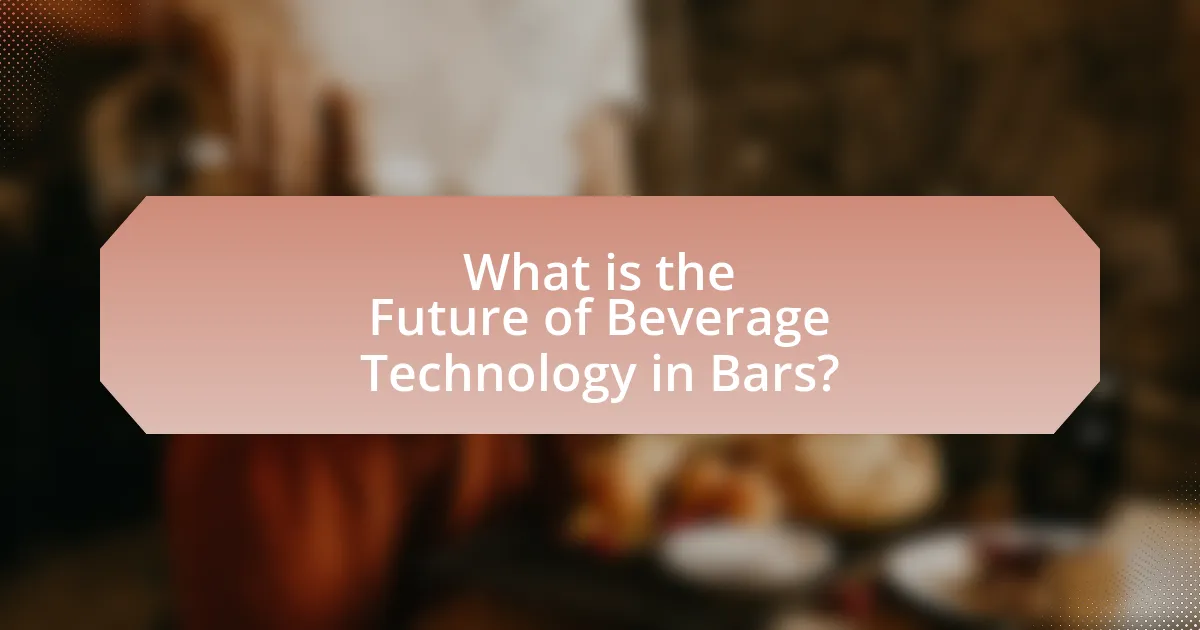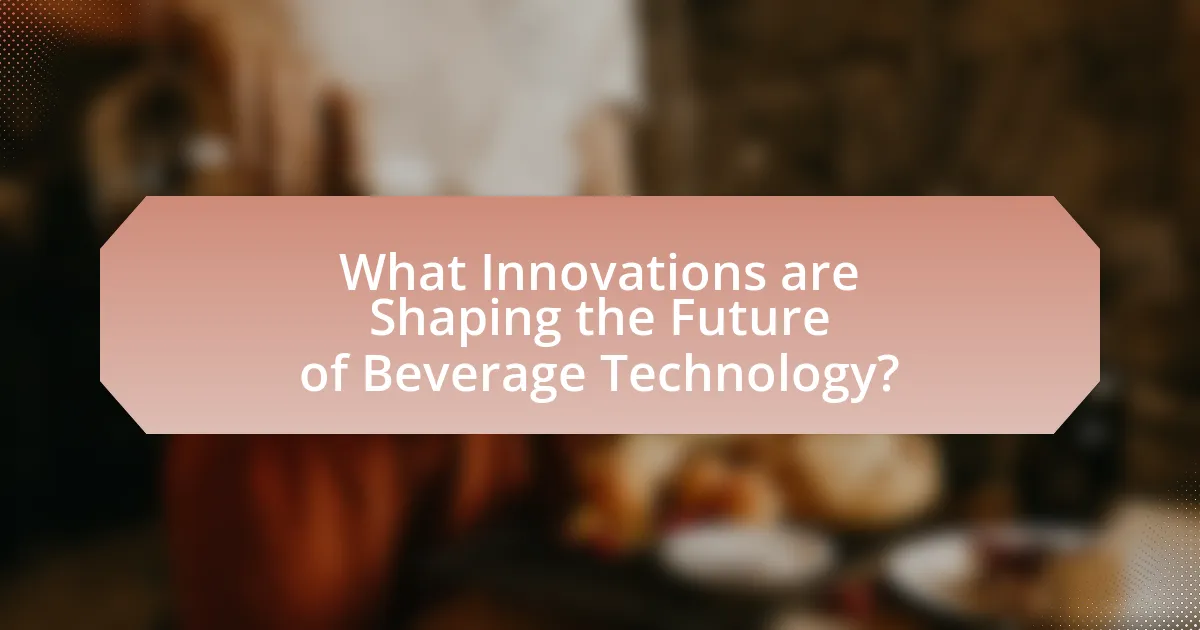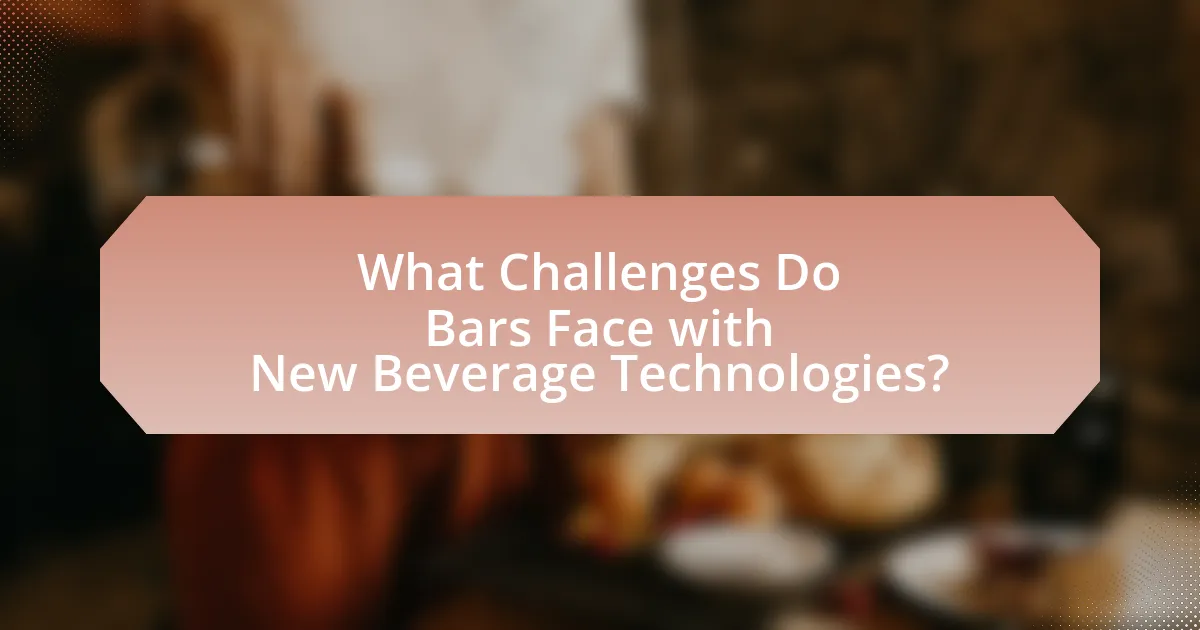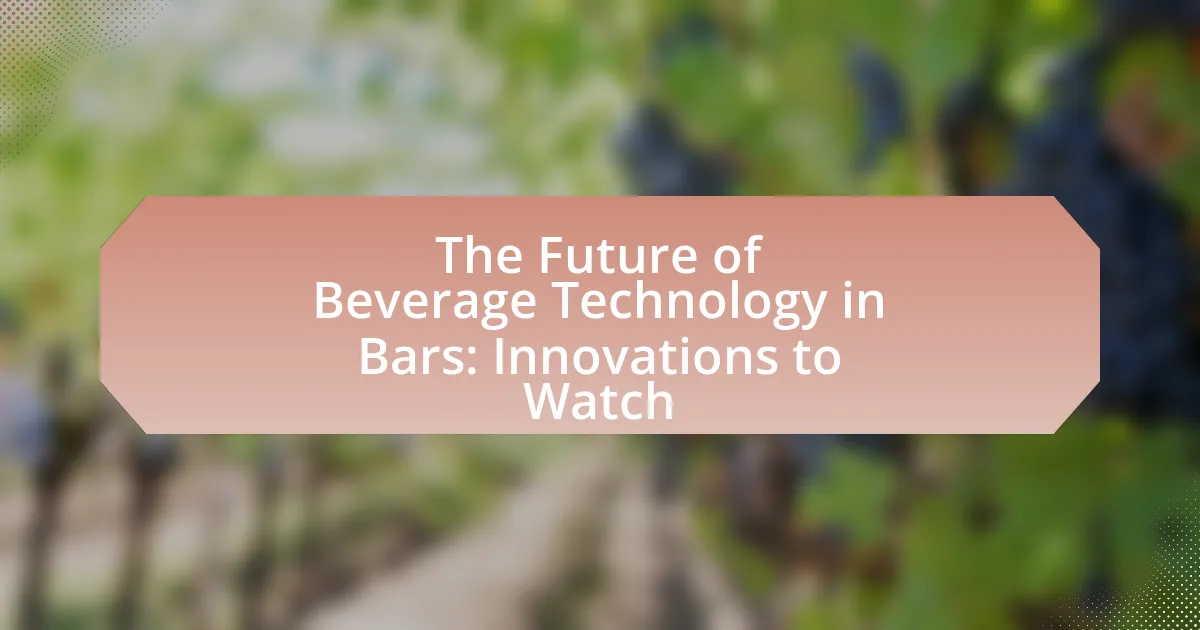The article focuses on the future of beverage technology in bars, highlighting innovations such as automation, data analytics, and sustainability practices. Key trends driving this evolution include enhanced customer experiences through personalized drink offerings and the integration of eco-friendly solutions. The discussion covers the challenges bars face in adopting new technologies, the importance of staff training, and strategies for successful implementation. Additionally, it emphasizes the role of consumer preferences in shaping beverage technology advancements and the significance of staying updated on emerging trends to remain competitive in the industry.

What is the Future of Beverage Technology in Bars?
The future of beverage technology in bars will be characterized by increased automation, enhanced customer experience, and innovative product offerings. Automation technologies, such as robotic bartenders and smart dispensing systems, are expected to streamline operations and improve efficiency, allowing bartenders to focus on customer interaction. Additionally, advancements in data analytics and artificial intelligence will enable bars to personalize drink recommendations and optimize inventory management. For instance, a report by the National Restaurant Association indicates that 70% of operators believe technology will enhance customer service in the coming years. Furthermore, the integration of sustainable practices through technology, such as eco-friendly packaging and waste reduction systems, will likely become a priority as consumers increasingly demand environmentally responsible options.
How is beverage technology evolving in the bar industry?
Beverage technology in the bar industry is evolving through advancements in automation, data analytics, and innovative equipment. Automation is streamlining processes such as cocktail mixing and inventory management, allowing bars to enhance efficiency and consistency. For instance, robotic bartenders can prepare drinks with precision, reducing wait times and labor costs. Data analytics is enabling bars to better understand customer preferences and optimize their offerings, leading to more personalized experiences. Additionally, innovations like smart taps and connected devices are improving inventory tracking and reducing waste. These technological advancements are reshaping the operational landscape of bars, making them more efficient and customer-focused.
What are the key trends driving innovation in beverage technology?
Key trends driving innovation in beverage technology include automation, sustainability, and personalization. Automation is transforming beverage preparation through advanced machinery and robotics, enhancing efficiency and consistency in bars. Sustainability is increasingly prioritized, with a focus on eco-friendly packaging and sourcing ingredients responsibly, reflecting consumer demand for environmentally conscious practices. Personalization is gaining traction as technology enables tailored drink experiences, allowing customers to customize flavors and ingredients, thereby enhancing customer engagement and satisfaction. These trends are supported by market research indicating a growing consumer preference for innovative, sustainable, and personalized beverage options.
How do consumer preferences influence beverage technology advancements?
Consumer preferences significantly influence beverage technology advancements by driving innovation in product development and production processes. As consumers increasingly seek healthier, sustainable, and personalized options, beverage companies respond by investing in technologies that enhance flavor, nutritional value, and environmental sustainability. For instance, the rise in demand for low-sugar and organic beverages has led to advancements in natural sweeteners and extraction methods, allowing brands to create products that align with consumer health trends. Additionally, the popularity of craft beverages has spurred the development of small-batch brewing technologies and automated systems that maintain quality while scaling production. This alignment between consumer desires and technological capabilities demonstrates how market demands shape the evolution of beverage technology.
Why is beverage technology important for modern bars?
Beverage technology is crucial for modern bars because it enhances efficiency, improves customer experience, and drives innovation in drink offerings. Advanced systems, such as automated cocktail machines and inventory management software, streamline operations, allowing bartenders to focus on creativity and customer interaction. Additionally, technology enables bars to offer unique and personalized drink experiences, such as custom cocktails based on customer preferences, which can increase customer satisfaction and loyalty. The integration of data analytics helps bars understand consumer trends and optimize their menus, leading to increased sales and profitability.
What advantages does technology bring to bar operations?
Technology enhances bar operations by improving efficiency, accuracy, and customer experience. Automated systems streamline inventory management, reducing waste and ensuring optimal stock levels. Point-of-sale systems facilitate faster transactions, minimizing wait times and increasing customer satisfaction. Additionally, data analytics provide insights into customer preferences, enabling bars to tailor their offerings and promotions effectively. For instance, a study by the National Restaurant Association found that 70% of operators believe technology improves service speed, demonstrating its significant impact on operational success.
How does technology enhance customer experience in bars?
Technology enhances customer experience in bars by streamlining service, personalizing interactions, and improving operational efficiency. For instance, mobile ordering apps allow patrons to place orders directly from their smartphones, reducing wait times and increasing convenience. Additionally, digital menus with interactive features enable customers to explore drink options and receive recommendations based on their preferences, fostering a more engaging experience. Furthermore, bars utilizing point-of-sale systems integrated with customer relationship management tools can track customer preferences and purchase history, allowing for tailored promotions and improved service. According to a study by the National Restaurant Association, 70% of consumers are more likely to visit a bar that offers technology-driven conveniences, highlighting the positive impact of these innovations on customer satisfaction.

What Innovations are Shaping the Future of Beverage Technology?
Innovations shaping the future of beverage technology include automated bartending systems, smart drink dispensers, and sustainable packaging solutions. Automated bartending systems, such as robotic bartenders, enhance efficiency and consistency in drink preparation, with examples like Makr Shakr, which can mix cocktails with precision. Smart drink dispensers utilize IoT technology to monitor inventory and optimize drink serving, improving operational efficiency in bars. Additionally, sustainable packaging innovations, like biodegradable cups and reusable straws, address environmental concerns and are increasingly adopted by beverage companies to reduce waste. These advancements reflect a trend towards automation, efficiency, and sustainability in the beverage industry.
What are the latest technological advancements in beverage preparation?
The latest technological advancements in beverage preparation include automated cocktail machines, precision brewing systems, and smart dispensers. Automated cocktail machines, such as the Bartesian and Drinkworks, allow users to create cocktails with the push of a button, utilizing pre-packaged ingredients and precise measurements. Precision brewing systems, like the PicoBrew, enable home brewers to replicate commercial brewing processes with exact temperature control and timing, enhancing flavor consistency. Smart dispensers, equipped with IoT technology, monitor inventory levels and provide real-time data analytics, optimizing supply management and reducing waste. These advancements reflect a growing trend towards automation and data-driven solutions in the beverage industry, enhancing efficiency and user experience.
How do automated systems improve efficiency in bars?
Automated systems improve efficiency in bars by streamlining operations, reducing wait times, and minimizing human error. These systems, such as automated drink dispensers and inventory management software, allow for faster service by enabling bartenders to focus on customer interaction rather than repetitive tasks. For instance, automated drink dispensers can pour precise measurements quickly, which not only speeds up drink preparation but also ensures consistency in beverage quality. Additionally, inventory management systems can track stock levels in real-time, reducing the likelihood of over-ordering or running out of popular items, thus optimizing supply chain efficiency. According to a study by the National Restaurant Association, implementing technology in bars can lead to a 20% increase in operational efficiency, demonstrating the tangible benefits of automation in this sector.
What role does artificial intelligence play in beverage customization?
Artificial intelligence plays a crucial role in beverage customization by analyzing consumer preferences and optimizing drink formulations. AI systems utilize data from customer interactions, social media trends, and historical sales to create personalized beverage recommendations. For instance, companies like Coca-Cola have implemented AI-driven platforms that allow customers to customize their drinks based on flavor profiles and dietary restrictions, enhancing customer satisfaction and engagement. This data-driven approach not only improves the customer experience but also enables businesses to adapt their offerings in real-time, leading to increased sales and brand loyalty.
How are sustainability practices integrated into beverage technology?
Sustainability practices are integrated into beverage technology through the adoption of eco-friendly production methods, waste reduction strategies, and the use of sustainable ingredients. For instance, many beverage companies are implementing closed-loop systems that recycle water and reduce energy consumption during production. Additionally, the use of biodegradable packaging and sourcing local, organic ingredients minimizes the carbon footprint associated with transportation and farming. According to a report by the Beverage Marketing Corporation, 60% of consumers prefer brands that demonstrate environmental responsibility, highlighting the market demand for sustainable practices in beverage technology.
What technologies are being developed to reduce waste in bars?
Technologies being developed to reduce waste in bars include smart inventory management systems, automated drink dispensers, and waste tracking software. Smart inventory management systems utilize data analytics to optimize stock levels, minimizing over-ordering and spoilage. Automated drink dispensers accurately measure and pour beverages, reducing spillage and over-pouring, which can lead to waste. Waste tracking software monitors and analyzes waste patterns, enabling bars to identify areas for improvement and implement strategies to reduce waste effectively. These technologies collectively contribute to more sustainable operations in the beverage industry.
How can bars utilize eco-friendly materials in beverage service?
Bars can utilize eco-friendly materials in beverage service by incorporating biodegradable straws, reusable glassware, and sustainably sourced ingredients. Biodegradable straws, made from materials like bamboo or paper, reduce plastic waste significantly; for instance, the use of paper straws can decrease plastic straw consumption by billions annually. Reusable glassware minimizes single-use plastic and can be made from recycled materials, promoting a circular economy. Additionally, sourcing ingredients from local, organic farms not only supports sustainable agriculture but also reduces carbon footprints associated with transportation. These practices collectively contribute to a more sustainable beverage service model in bars.

What Challenges Do Bars Face with New Beverage Technologies?
Bars face several challenges with new beverage technologies, including high initial costs, staff training requirements, and integration with existing systems. The implementation of advanced technologies, such as automated cocktail machines or digital inventory management systems, often requires significant financial investment, which can be a barrier for smaller establishments. Additionally, staff must be trained to operate and maintain these new systems effectively, which can lead to increased labor costs and time. Furthermore, integrating new technologies with legacy systems can create operational complexities, potentially disrupting service and customer experience. According to a 2022 industry report by the National Restaurant Association, 70% of bar owners cited technology integration as a major hurdle in adopting new beverage innovations.
What are the common barriers to adopting new beverage technologies?
Common barriers to adopting new beverage technologies include high initial costs, lack of technical knowledge, resistance to change among staff, and regulatory challenges. High initial costs can deter bars from investing in advanced equipment or systems, as they may not see immediate returns on investment. Lack of technical knowledge can hinder effective implementation and operation of new technologies, leading to underutilization. Resistance to change among staff often stems from comfort with existing processes, making it difficult to integrate new methods. Additionally, regulatory challenges can complicate the adoption of innovative technologies, as compliance with local laws and health regulations may require significant adjustments.
How can bars overcome resistance to technological change?
Bars can overcome resistance to technological change by implementing staff training programs that emphasize the benefits of new technologies. Training equips employees with the necessary skills and knowledge, reducing anxiety and increasing confidence in using new systems. For instance, a study by the National Restaurant Association found that 70% of employees felt more positive about technology when they received proper training. Additionally, involving staff in the decision-making process for new technology can foster a sense of ownership and acceptance, as they are more likely to embrace changes they helped choose.
What training is necessary for staff to effectively use new technologies?
Staff training necessary for effectively using new technologies in bars includes comprehensive instruction on the specific systems and tools being implemented, such as point-of-sale systems, inventory management software, and beverage dispensing technologies. This training should encompass hands-on practice, tutorials, and ongoing support to ensure proficiency. Research indicates that 70% of employees feel more confident in their roles when they receive adequate training, which directly correlates to improved customer service and operational efficiency in the beverage industry.
How can bars ensure a smooth transition to advanced beverage technologies?
Bars can ensure a smooth transition to advanced beverage technologies by implementing comprehensive staff training programs and gradually integrating new systems. Training equips staff with the necessary skills to operate advanced equipment, such as automated cocktail machines or smart inventory systems, which can enhance efficiency and customer experience. For instance, a study by the National Restaurant Association found that 70% of restaurant operators believe that technology improves service quality. Additionally, bars should adopt a phased approach to technology integration, allowing for adjustments based on customer feedback and operational performance. This method minimizes disruption and fosters a culture of adaptability among staff, ultimately leading to a successful transition.
What strategies can be implemented for successful technology integration?
Successful technology integration in bars can be achieved through comprehensive staff training, effective communication, and continuous evaluation of technology performance. Training ensures that staff are proficient in using new systems, which enhances operational efficiency and customer service. Effective communication among team members fosters collaboration and quick problem-solving when issues arise. Continuous evaluation allows bars to assess the impact of technology on operations and make necessary adjustments, ensuring that the integration remains aligned with business goals. Research indicates that establishments that prioritize these strategies experience a 30% increase in operational efficiency and a 20% boost in customer satisfaction, demonstrating the effectiveness of these approaches in the hospitality industry.
How can bars measure the impact of new technologies on their operations?
Bars can measure the impact of new technologies on their operations through key performance indicators (KPIs) such as sales data, customer feedback, and operational efficiency metrics. By analyzing sales data before and after implementing new technologies, bars can quantify changes in revenue and identify trends linked to specific innovations. Customer feedback, collected through surveys or digital platforms, provides insights into customer satisfaction and preferences, allowing bars to assess the effectiveness of technology in enhancing the customer experience. Additionally, operational efficiency metrics, such as inventory turnover rates and labor costs, can reveal improvements in workflow and resource management resulting from technological advancements. For instance, a study by the National Restaurant Association found that 70% of operators reported increased efficiency after adopting point-of-sale systems, demonstrating a clear link between technology and operational performance.
What are the best practices for implementing beverage technology in bars?
The best practices for implementing beverage technology in bars include assessing operational needs, selecting user-friendly systems, training staff effectively, and integrating technology with existing workflows. Assessing operational needs ensures that the chosen technology addresses specific challenges, such as inventory management or customer engagement. Selecting user-friendly systems minimizes the learning curve for staff, enhancing efficiency and service quality. Effective staff training is crucial, as it empowers employees to utilize the technology fully, leading to improved customer experiences. Integrating technology with existing workflows ensures seamless operations, reducing disruptions and maximizing productivity. These practices are supported by industry trends indicating that bars adopting technology see increased efficiency and customer satisfaction.
How can bars stay updated on emerging beverage technology trends?
Bars can stay updated on emerging beverage technology trends by actively engaging with industry publications, attending trade shows, and participating in professional networks. Industry publications such as Beverage Industry and The Spirits Business regularly feature articles on the latest technological advancements, providing bars with insights into new products and innovations. Trade shows like the National Restaurant Association Show and Bar Convent Berlin showcase cutting-edge technologies and allow bar owners to interact with suppliers and experts. Additionally, joining professional networks and associations, such as the United States Bartenders’ Guild, facilitates knowledge sharing and access to resources that highlight current trends and best practices in beverage technology.
What resources are available for bars to learn about new technologies?
Bars can access various resources to learn about new technologies, including industry publications, online courses, and technology expos. Industry publications such as “Beverage Dynamics” and “The Spirits Business” provide insights into emerging trends and innovations. Online platforms like Coursera and Udemy offer courses specifically tailored to bar management and technology integration. Additionally, technology expos like the National Restaurant Association Show showcase the latest advancements in beverage technology, allowing bar owners to engage with vendors and learn about new tools and systems. These resources collectively equip bars with the knowledge needed to stay competitive in a rapidly evolving industry.


